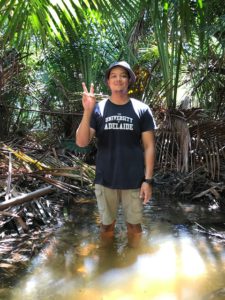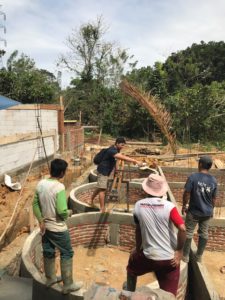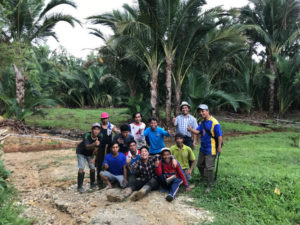With GFAR alumni spread across more than twenty countries, we hear some incredible stories and achievements from our graduates who have done some amazing work in agribusiness and international development. Reyza Ramadhan from Indonesia graduated from the Master of Global Food and Agricultural Business (MGFAB) in 2016 and is currently the Program officer and National Consultant for Agribusiness at the Food and Agriculture Organisation (FAO) – Indonesia. We recently caught up with Reyza to learn more about his work with FAO and his experiences at GFAR.

What inspired you to get into the field of food and Agribusiness and International Development?
FAO statistics show that at the start of the new millennium 2.57 billion people (42% of total world population) depended on agriculture, hunting, fishing or forestry for their livelihoods, including those actively engaged in those activities and their non-working dependants. Agriculture powers the economies of most developing countries, like Indonesia. Historically, many countries have experienced rapid economic growth and poverty reduction that has been either preceded or accompanied by agricultural growth. Agriculture as a way of life, heritage, cultural identity, and as an ancient pact with nature, is integral to our life – there is no price tag on this, and this led me to be inspired and to get involved. I am a firm believer that using an holistic and global approach to developing agriculture can have positive and catalytic impact, not just on ending hunger and creating a decent source of livelihood, but also protecting the environment. Agribusiness gives you an opportunity to work in intersections of these issues.
Can you narrate briefly about your experience of studying the Masters program at GFAR?
I really liked the study environment at GFAR. One of the aspects I liked the most was how open and approachable the academics were. I really appreciate the guidance I received from Prof. Wendy Umberger and my former supervisors Dr. Risti Permani and Mr. Theo Simos. Studying and living in Adelaide was dynamic and exciting with the atmosphere that comes with being based in a place which is home to world-class agribusiness leaders, scholars and a unique agricultural hub. It was thrilling to learn and get to work with such a wide range of inspiring people. Moreover, the program is very diverse in terms of research projects and the technical expertise that comes with it. Everyone is highly qualified and passionate about what they do, making them the best mentors for students.
What were some of the major challenges in your Masters journey and how did you deal with them?
The moment when my Mother passed away in the middle of my master’s degree was the most challenging situation. I cannot thank enough for the support I received from fellow students and the teaching staff during that difficult time. I came back stronger and was able to finish what I had started.
How did you get the opportunity to work with the FAO?
During my very first class Prof. Randy Stringer spoke about his previous work with FAO, and it really motivated me to pursue a career with FAO. At the end of my program I actively sought opportunities with FAO Indonesia but never heard from them. One day I was in my father’s sweet potato farm near my hometown helping farmers harvest a beautiful indigenous sweet potato called “Ubi Cilembu”. Suddenly the phone was ringing and I got an invitation for a job interview with FAO Indonesia. After several rounds of interviews and procedures, I got the job and joined FAO as a National Consultant.
What work/projects have you been involved in with the FAO?
My role involves various project management activities. I prepare working papers, briefing notes, presentation materials in technical areas related to FAO’s work particularly on Rural Development and Food Security, by collecting, preparing and analysing relevant data and information. I also facilitate close liaison with appropriate focal points in the Ministry of Agriculture and Ministry of Villages, Disadvantaged Areas and Transmigration. I have been involved in two focus programs, Promoting Sago Starch Utilisation and Conservation Agriculture in Maize.

- Promoting Sago Starch Utilization
The project involves three programs; first, developing a sago farm with an agro-economic approach, ensuring better productivity and quality sago palms. Second, building an integrated hygienic and no-waste sago-processing unit. Third, creating an integrated business unit that manages sago farming, processing, and marketing. The sago palm processing unit installed with FAO support has placed emphasis on hygiene, cost effectiveness, and even waste recovery through the technology used, to assure that the unit is environmentally friendly. A part of the ‘zero-waste’ processing unit, the sago tree bark waste can be used to make charcoal, while the dregs can be used to grow edible mushrooms, and the liquid waste can be turned into biogas or ethanol. Previously, much of the waste materials were not used, while the liquid waste was polluting the river.
- Conservation Agriculture in Maize
I have also been involved in introducing conservation agriculture (CA) techniques in Nusa Tenggara Timur and Nusa Tenggara Barat Provinces to enhance small farmer adaptation to climate change. The introduced conservation agriculture techniques have shown promising results, with maize yields on average 77% higher, when compared to conventional farming practices. Three key principles are applied in CA, including minimum soil disturbance, permanent soil cover, and crop rotation. Conservation agriculture aims to achieve sustainable and profitable agriculture and subsequently works towards improved livelihoods of farming families.
What is your advice for young professionals and early career researchers to achieve success in this field?
“Smooth seas never made a skilful sailor”. I believe, as an early career researcher in agriculture and international development, facing difficulties is just a normal day at work; the key is to just keep faith. I encourage young/early career researchers to be more creative and utilise more opportunities to collaborate. Expanding your network, try to connect with academic community, experts, and enthusiasts outside your area of interest.

Looking forward, what are your plans for the future?
FAO’s mandate is the most important mandate in the world to eradicate hunger. I want to be able to bridge my technical knowledge with social considerations in a way to achieve that global goal. We have successfully managed several programs and it has been great to see the successes of beneficiaries from the work that has been done. I want to continue to deliver these results. I am happy with the work we are doing. I am also interested in delving even deeper into the food value chain and its diverse modalities. These experiences will keep defining my interests and career prospects, so within five years’ time I feel that PhD studies are on my radar as well.
Is there anything else you would like to share with us?
There are so many interesting stories about my masters days; I don’t know where to start! The social and multicultural atmosphere is surely one of the biggest highlights of my experience at GFAR. I met wonderful students and teachers during my time there. In addition, one of the things I like the most about living in Adelaide was having the chance to see beautiful places. Adelaide offered a great mix of beautiful landscapes, sparkling beaches, rolling hills and a vibrant city centre. I also had a life-long dream come true, when my best mates and I did a road trip to New Zealand and the Red Centre, Uluru! It was amazing. So much fun and so thrilling. Something I will remember forever.
We would like to congratulate Reyza on all his achievements and successes and wish him all the best for his future endeavours.

